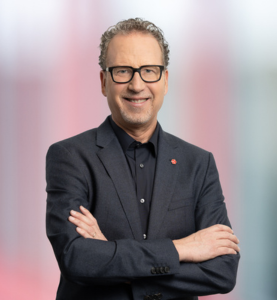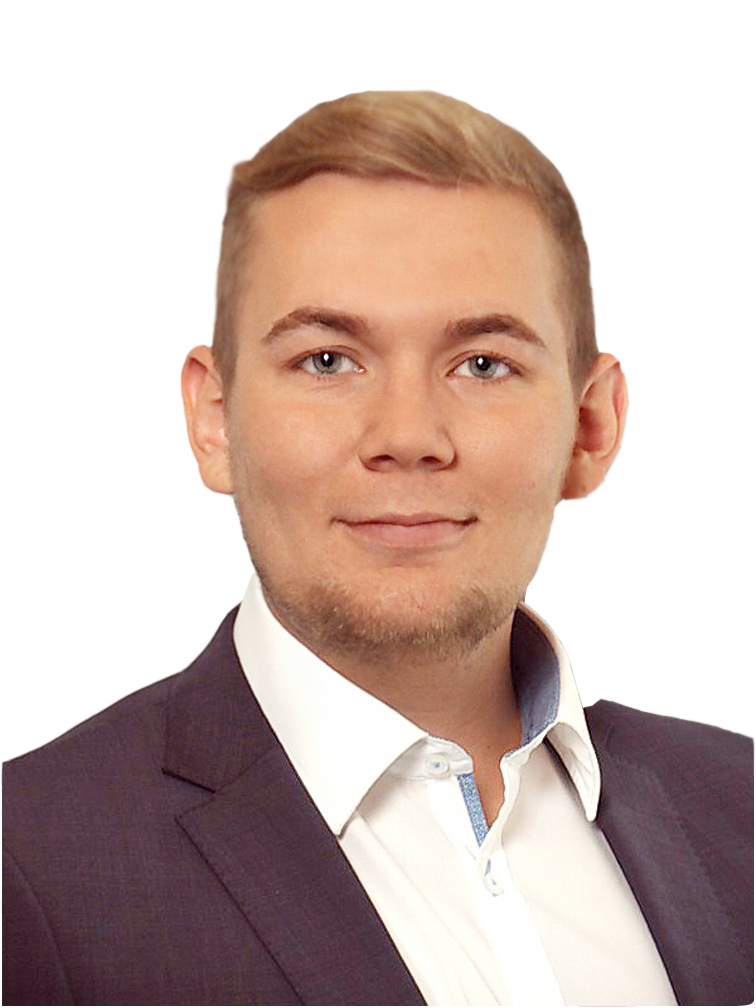DPD Switzerland has established itself as a determined visionary in a sector going through constant change. In this interview, Tilmann Schultze shares his vision of the major trends that will redefine logistics in the years to come. He reveals the ambitious initiatives of DPD Switzerland designed to reduce CO2 emissions, adapt to new customer expectations and foster a corporate culture centred on people and innovation. Find out how leadership, adaptability and resilience come together to build the future of logistics.
DPD: ‘In your opinion, what major trends will transform the logistics sector in the next few years and how do you expect these changes to affect DPD Switzerland?’
Tilmann: ‘Many revolutions with no real industrial applications (such as deliveries by drones or autonomous robots) have been announced over the last few years.
But one thing is certain: if we are to achieve our goal of cutting our CO2 emissions by 75% by 2030 (compared to 2020), we must focus on both technological and structural advancements. In particular, this includes optimising delivery routes to reduce travel time, upgrading digital tools to improve communication with consignees and maximise successful deliveries on the first attempt and improving the autonomy of electric vehicles. From a structural perspective, it will be equally essential to modernise infrastructure – such as charging stations, sorting technology and digitisation. The boom in e-commerce and changing purchasing habits are also driving transformations, with out-of-home deliveries in particular increasingly favoured by the new breeds of online shoppers. Likewise, returns management plays a significant role in Switzerland because we have the highest rate of returns in all of Europe.
To overcome these challenges, we must innovate, keep a close eye on emerging technology and think outside of the box. Adaptability and responsiveness will be the name of the game in the years to come.’

DPD: ‘What long-term vision do you hope to develop for DPD Switzerland and what steps have you defined to realise it?’
Tilmann: ‘When I came to Switzerland, I set myself the goal of building the enterprise in which I had always dreamed of working but never truly found. An enterprise where you want to come to work and talk to others, where you work in confidence and where you feel free to show initiative (and get things wrong). Essentially, an enterprise where the thought of coming into work the next day never makes you never feel sick to your stomach on a Sunday afternoon.
Our long-term vision, “Progress in Motion & People at Heart”, reflects our state of mind: to trust everyone to improve our processes, technology and organisation on a daily basis, all the while encouraging a team spirit and the people who make up those teams, as the men and women of DPD Switzerland are our most valuable asset. This vision ties in with my belief that if employees feel supported and recognised, they will make our customers happy – and their satisfaction is ultimately the only key to success.’
DPD: ‘How do you adapt your leadership style to promote the well-being of employees whilst also meeting performance targets?’
Tilmann: ‘It is important to adapt, but so is staying true to your personality.
I believe that the well-being of employees comes from the feeling of being fully integrated and appreciated, whatever the level of responsibility. That is why I regularly communicate in the broadest, most transparent way possible (gone are the days when management thought it held the power and did not share information). This way, everyone understands the shared goals and is able to organise accordingly.
The second condition is that to feel free and perform well, you must have confidence in your hierarchy. To build confidence, you must practise what you preach, so as not to leave any room for interpretation. I am committed to providing my teams with clear information about what we are going to do, then I strive to do all I can do make it happen. And if, for some reason or other, there is a change of opinion or direction, we explain why.’
DPD: ‘Can you tell us about a difficult decision you have had to make recently as CEO, and how did you assess the risks and benefits?’
Tilmann: ‘It is my job to make difficult decisions and take risks. I was recently forced to decide whether or not to launch a new service for our customers, even though my hierarchy was of a different opinion.
I therefore had to weigh the risks and benefits, as failure is not an option when you make this sort of decision. I gave my teams the difficult task of painting an accurate picture of the benefits for both us and our customers, in order to minimise the uncertainty and risks. I then decided to trust them. If it proved successful, the credit would go to the team, and if it failed, I would take sole responsibility. I am pleased to report that it was a success!’
DPD: ‘As CEO, how do you manage the stress and mental strain of your huge responsibilities?’
Tilmann: ‘In reality, it is not so easy to maintain your zen when you bear ultimate responsibility for everything that happens, and I do not really have a miracle cure that always works. Whether it’s my teams or my family, I try to take a step back for a mental breather when things get difficult – as they say, it’s only business after all.
As often as possible, I like to unwind on a tennis court or do Qigong exercises. I also read a lot, which lets my mind embrace the imagination of the author and escape into the stories.’
DPD: ‘What lessons have you learned about crisis management, especially with regard to the pandemic or other recent unforeseen events?’
Tilmann: ‘It is often said that teams prove themselves in times of crisis. The recent pandemic showed me that my teams were in place and united in the face of the crisis, flexible in the face of changes and ready to fight to support our customers.
As far as I am concerned, the idea was to stay calm and not panic in spite of the difficulties (or rather to make it look that way), to adapt to every situation every day, to guide my teams every day and to let them work.’
DPD: ‘As CEO, what specific steps are you taking to bolster the corporate culture at DPD Switzerland?’
Tilmann: ‘Our corporate culture underpins everything; it supports the development of the company and contributes to the well-being of employees. A culture cannot be imposed; it grows from day to day as a result of our attitudes and decisions. Ours is based on trust, respect and freedom for everyone to voice their ideas and take initiative, all while never losing sight of the essentials. Naturally, a CEO must set an example by following the same rules as his or her teams.’
DPD: ‘What with everything we have spoken about, what skills or qualities do you consider essential in order to succeed as a CEO today?’
Tilmann: ‘I imagine there are as many successful CEOs as there are different profiles.
As far as I am concerned, I think that the ability to maintain a steady frame of mind, to stay calm even in times of chaos, to listen instead of speaking, to persuade rather than impose, to say what you are going to do and do what you said, to involve and unite your teams and to trust them are all skills I try to demonstrate. I am in favour of allowing personalities to express themselves within a collective, and so I permit myself to remain myself in a professional environment without playing a role, without “playing” at CEO.’



